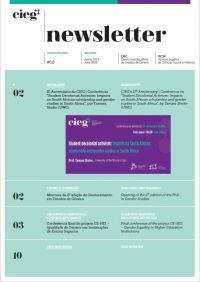CIEG organized its first International Congress. Under the overall theme Gender Studies in Debate: Pathways, challenges and interdisciplinary perspectives, the Congress aimed to strengthen the impact of gender, women’s and feminists studies, contribute to knowledge exchange on these topics an explore new ways to improve gender equality and social justice.
Academic and scientific relevance of the congress
While gender equality has increasingly been on the public agenda, there have been advances and retreats and persisting gender inequalities continue to challenge us to look for more solid analyses. CIEG’s Congress aimed to address this gap and contribute to the analytical deepening of these issues. The event brought to the debate the contributions of 270 researchers from different parts of the world, including 175 from Europe, 45 from Latin America and 50 from countries in North America, Africa, Asia and Australia.
The Congress succeeded in establishing a very positive and productive atmosphere among the researchers and the guest speakers who attended the event. The debates were stimulating and intellectually profound, the organization was smooth, and for all of this we are extremely grateful for all of those who could join us in Lisbon during these days.
Opening and closing sessions
Anália Torres, CIEG's Coordinator, opened the Congress on 25 May 2016, welcoming the participants, reviewing CIEG’s goals and stressing the need to develop and intersect gender, feminist and women’s studies. In this session, Alice Trindade, the Vice-President of ISCSP, Joana Gíria, President of the Comissão para a Igualdade no Trabalho e no Emprego (CITE) and Fátima Duarte, President of the Comissão para a Cidadania e Igualdade de Género (CIG) also addressed the audience. The closing session featured Catarina Marcelino, the Secretary of State for Citizenship and Equality, and Helena Monteiro, Vice President of ISCSP. Anália Torres addressed some final thoughts acknowledging the vibrant presence of all the participants and thanking again the support of speakers and staff.
Keynote Speakers
On 25 may, the first day of the Congress, the Keynote address was delivered by Professor Margaret Abraham, from Hofstra University, New York, USA and President of the International Sociological Association (ISA), under the theme Making a Difference: Addressing Gendered and Intersectional Violence.
On 26 may, the Keynote Speaker Jeff Hearn, Guest Research Professor, from Örebro University, Sweden, addressed the theme On men, masculinities and gender power relations: A one-way transversal dialogue with myself around some pathways, challenges and interdisciplinary perspectives.
On the last Plenary Session, the invited Keynote Speaker was Miriam Grossi, Titular Professor of the Department of Anthropology of the Federal University of Santa Catarina, Brazil, who delivered a talk on the theme Gender Studies and Feminist Academic Militancy in Contemporary Brazil | Gender Studies and Feminist Academic Militancy in Contemporary Brazil.
Roundtables, semi plenary and parallel sessions
During the three-day period of the event the following plenary Roundtables took place: Critical reflections on gendered Inequalities; Gendered Violence: achievements, obstacles and challenges; Gender, human rights, feminisms and LGBTQIA rights, gathering scholars from different backgrounds. There were also six semi-plenary sessions addressing the topics: Gender studies and feminisms in southern Europe; Rights, work and family; Gender equality policies: impacts and limits; Gender, women’s studies and feminisms in Portuguese; Gender and Education; Gender and Body.
On 26 may, parallel sessions began to take place, simultaneously, so participants could choose the theme that most interested them and participate accordingly. The themes addressed by the discussants were based on the three research lines indicated previously on the call for papers set by the Executive Committee of CIEG’s I International Congress: Gender, feminisms and women studies; Policies, institutions and citizenship; Gender and the construction of contemporary societies.


